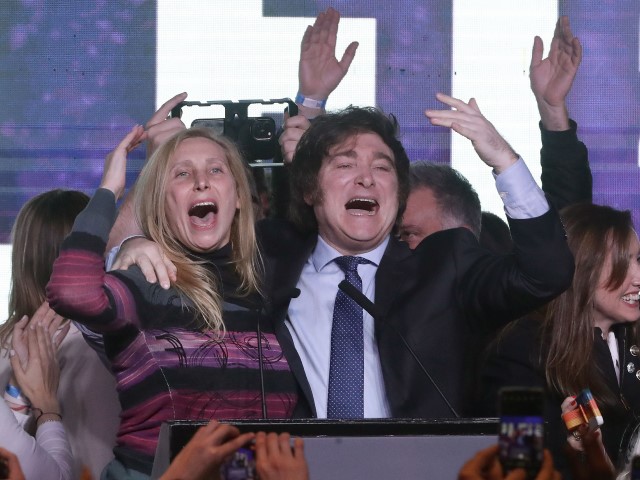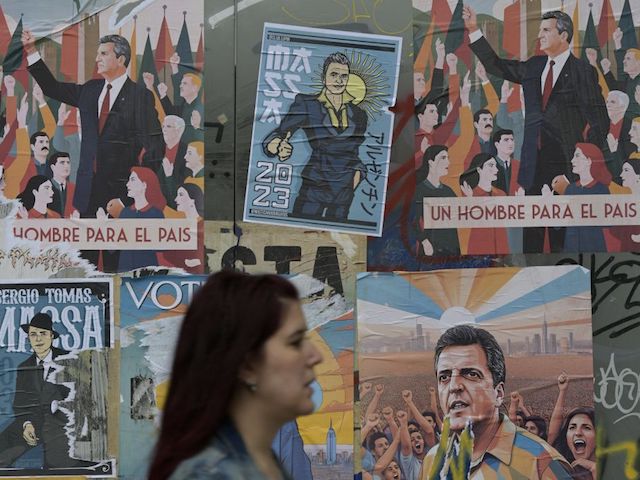The five candidates in Sunday’s presidential election in Argentina ended their campaigns on Thursday, observing a mandated period of silence beginning on Friday as polls show a tight race at the top.
Javier Milei, a libertarian populist economist who shattered expectations as the top vote-getter in the August national primaries, remains in the lead in most recent polls, but not by high enough of a margin to win the presidency on Sunday. Jockeying for second place are Patricia Bullrich, an establishment conservative candidate vowing hardline anti-crime policies, and Sergio Massa, a socialist who currently serves as the nation’s economic minister. Despite the country currently enduring a near-unprecedented economic crisis, the man leading the government’s fiscal policy repeatedly appears within the margin of error for second place against Bullrich, likely in part due to the lack of a formidable left-wing alternative at the ballot.
Milei ended his campaign on Wednesday night with a lively celebration in Buenos Aires’ Movistar Arena reportedly attended by approximately 15,000 people – the capacity of the venue – in which the crowd chanted anti-establishment slogans, and Milei proclaimed the election the most important in the modern history of the country. Bullrich and Massa are both expected to take the stage for their campaign conclusion parties on Thursday night.
An analysis of polls from the past week – Argentine election rules prevent firms from publishing polls after October 14 during this election cycle – by the Spanish newspaper 20 Minutos found Milei solidly in the lead in most polls with anywhere between 25 to 35 percent support from voters. Seven of eight polls analyzed showed Milei in the lead and Massa in second, with Bullrich a close third. The polls showed Massa with support ranging between 26.2 percent and 32.7 percent, compared to Bullrich’s 21.8 percent to 28.9 percent range, meaning the second-place position is far from decided.
In addition to traditional polls, the Argentine newspaper Clarín published a social media analysis finding that the most energy online appeared to be with Milei by a dramatic margin. Analyzing social media and online fora, the firm Metadata found that among all posts discussing a presidential candidate, 44 percent were talking about Milei. Bullrich and Massa were in a statistical tie, the former with a 25-percent slice and Massa at 26 percent. An analysis of the number of “likes” on social media posts about candidates shows that 63 percent of them went to posts discussing Milei, compared to 18 percent for Massa and 10 percent for Bullrich. Metadata did not clarify in the Clarín article if the “likes” went to posts speaking positively of all candidates, or if, for example, a “like” on a post disparaging Milei would be counted the same as a “like” on a post praising him.
In Argentina, voting is mandatory, and those who do not show up to the polls receive a fine. To win the presidency on October 22, a candidate must receive either 45 percent of the vote or 40 percent of the vote with a ten-point lead ahead of the second-place finisher. In the event that, as polls indicate, no candidate earns such a lead, the top two vote-getters go on to a runoff election in November.
Milei appears to be firmly in runoff territory. The close polling between Bullrich and Massa means two very different runoff campaigns, however, as Milei would either be courting Bullrich’s establishment conservative voters to unite against Massa or competing with Bullrich for disenchanted leftists.

Argentine far-right libertarian economist and presidential candidate Javier Milei celebrates the results of the primary elections with his sister Karina Milei at his headquarters in Buenos Aires on August 13, 2023 (ALEJANDRO PAGNI/AFP via Getty).
Bullrich’s campaign has focused on promises to cut down Argentina’s increasing crime rate under the current socialist rule and claims the candidate will tame rampant inflation, the dominant topic of this election. While her promises are similar to Milei’s, Bullrich has presented herself as an experienced, less risky alternative to Milei, a hardline conservative who rose to prominence through social media and has been in the Argentine Congress only since 2021.
CUYO, LIBRE DE KIRCHNERISMO
San Juan ya eligió el cambio con @DrMarceloOrrego como gobernador y se liberó del kirchnerismo. Ahora demos esta batalla para liberar el país de una vez y para siempre de un sistema que corrompió la Argentina.Con diez gobernadores, tres de ellos de… pic.twitter.com/5b5wjVEKE0
— Patricia Bullrich (@PatoBullrich) October 17, 2023
While competing for right-wing votes with Milei, Bullrich has struggled to keep even high-profile members of her political coalition from expressing sympathy for her rival. Former Argentine President Mauricio Macri, who preceded incumbent President Fernández, caused controversy during the campaign by making statements that appeared to indicate he was not supporting the candidate running under his party’s coalition. Following Milei’s victory in the primaries, Macri celebrated the “change of an era” and later claimed that Bullrich’s coalition would support any “reasonable” proposals a hypothetical Milei presidency would attempt to enact. The latter reportedly caused particular friction with Bullrich because a core argument her campaign had presented against Milei is that, as an outsider, he would not be able to get Congress to support his reforms.
“We are in the middle of an election fight and it doesn’t seem to me that in this moment we should discuss that because our strength in this election is precisely our parliamentary capacity,” Bullrich griped.
Macri will reportedly speak at Bullrich’s campaign closing event on Thursday in an attempt to patch up their strained public relationship.
Milei, in turn, has dismissed both Bullrich and Massa as part of the same establishment that has brought Argentina’s peso to near ruins and given it an inflation rate of more than 130 percent, the third-highest in the world. He is proposing, among other promises, to eliminate ten of the country’s 18 cabinet-level federal agencies, to replace the Argentine peso with the U.S. dollar, and to cut government ties to communist countries.

A woman walks past electoral propaganda of Economy Minister and presidential candidate of the Union por la Patria party, Sergio Massa, made with AI (artificial intelligence) in Buenos Aires on October 3, 2023, ahead of Argentina’s presidential election to be held on October 22 (JUAN MABROMATA/AFP via Getty Images).
“A different Argentina is not possible with the same people as always,” Milei declared in a final message to voters on Wednesday.
Massa is preparing for an appearance in the runoff by attacking both simultaneously. His leftist campaign, supported by incumbent President Alberto Fernández, posted signs throughout public transport stations in Buenos Aires claiming that a vote for either Bullrich or Milei would result in a substantial increase in train ticket fares, as neither supports a major government subsidy currently in effect. Bullrich’s campaign condemned Massa for leveraging the incumbency of his political movement to place propaganda posters in presumably neutral government-owned areas, calling the posters an “institutionalized fear campaign.”
Massa, despite being part of the federal government, will present his final campaign appearance on Thursday at a factory, declaring himself the “president of the workers” and seeking to galvanize apathetic left-leaning voters to choose him rather than levy a blank vote on Sunday.

COMMENTS
Please let us know if you're having issues with commenting.